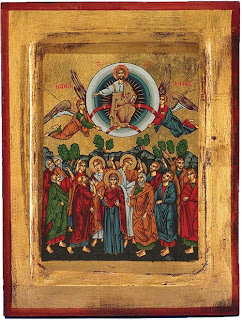Pentecost
Before posting the notes on Acts 2, I decided to place our lesson on Pentecost from last year first. This provides much of the background material to understand some of the significance of what is happening in Acts 2. As the name Pentecost indicates (pentekoste), this second of the great Jewish national festivals was observed on the 50th day, or 7 weeks, from the Paschal Feast, and therefore in the Old Testament it was called "the feast of weeks." It is but once mentioned in the historical books of the Old Testament (2Ch 8:12,13), from which reference it is plain, however, that the people of Israel, in Solomon’s day, were perfectly familiar with it: "offering according to the commandment of Moses, on the sabbaths, and on the new moons, and on the set feasts, three times in the year, even in the feast of unleavened bread, and in the feast of weeks, and in the feast of tabernacles." The requirements of the three great festivals were then well understood at this time,

